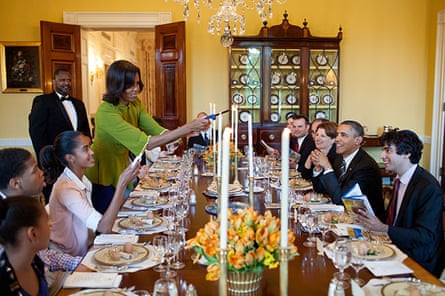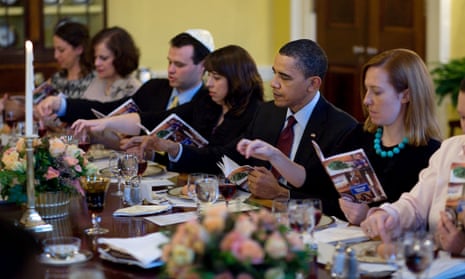Saturday 19 April 2008, had been a beautiful day, but there were no windows in a conference room at the Sheraton in Harrisburg, Pennsylvania, where the conference table was set for the Seder dinner, the ritual feast that marks the Jewish festival of Passover.
This particular Seder would gain great significance, however, as a tradition that would pass from this Harrisburg hotel room to the White House, where it would become the first ever celebrated there. On Thursday, the same celebrants who began the tradition, back when they were young staffers on the campaign trail for then senator Barack Obama, will sit down again together for Passover with the president for the ninth and final time.
The idea came about when 22-year-old national advance staffer Herbie Ziskend, 23-year-old ground logistics coordinator Eric Lesser, and 31-year-old new media director and videographer Arun Chaudhary realised that they wouldn’t be able to make it home from the campaign for Passover, and instead decided to hold a Seder for themselves in Harrisburg.
The setting wasn’t perfect. “It’s not the world’s most light hotel to begin with; frumpy carpets, slightly mildewed, and we were in the basement,” Chaudhary remembered. “With no disrespect to the hardworking people at the Harrisburg Sheraton,” Ziskend said, “it was literally the most ordinary hotel I’ve ever been to.”
On the table were the traditional ceremonial ingredients of a seder dinner: Kiddush cups and Manischewitz wine, matzo and gefilte fish, and Haggadas – the books from which, at Passover, Jews retell the story of the exodus from slavery in Egypt – all requisitioned by Lesser’s cousin, who was a student at the University of Pennsylvania.
The rituals also involve a symbolic lamb shank bone, but the hotel’s kitchen didn’t have one, so Lesser improvised by stripping the meat off a chicken drumstick.
The Sheraton was playing host to a cheerleading competition at the time, and the first sign that the junior senator from Illinois was near was a Beatlemania-like scream which went up from the hallway. Then, several secret service agents bounded in and looked over the room – one of them, Chaudhary remembered, even checked inside the soup tureen. Then, Obama opened the door and said: “Is this where the Seder is?”
Even by the standards of the hard-fought 2008 primary, Saturday 19 April had been a long and exhausting day. The previous evening, Obama had spoken in Philadelphia to his largest crowd to that point in the campaign, but the primary was a morass. Clinton was going to win the state, and the staff could feel it; and as if that wasn’t enough, Obama was dealing with the fallout of the Rev Jeremiah Wright story.

Obama had spent the day on a whistle-stop rail tour from Philadelphia to Harrisburg, making half a dozen stops along the way. Ziskend, who worked in advance logistics, had been racing at 80mph ahead of the train to get to each location before the senator arrived, to hand out signs to volunteers and rope off the area for the local press.
It was past 9pm by the time the group sat down together, but the Seder ritual offered a bounty of much-needed respite. “For the senator – and all of us – it was a pause,” Ziskend said. “And the Seder is supposed to be a pause.”
Part of the Passover tradition includes an invocation to recline; rituals of rest and reflection are key to the celebration. “And so we paused from this historical campaign, we paused from how tired we were, paused from the ups and downs of travelling. We knew deep down that our lives were about to change – and the senator’s life would change the most – and this was a chance to reflect,” Ziskend said.
The conversation did not avoid politics entirely. “Passover is a political holiday,” Chaudhary said. “It’s about oppression, tyranny, resistance, community.” It wasn’t lost on any of those around the table that they were retelling the ancient story of a people’s escape from slavery at a Seder with the man who would become the country’s first African American president. “I think there’s no way to engage with this holiday without it being quite political. But that being said, I don’t think we go farther than that.”
“One thing, [when] we did the reading out of the Haggadah, it just wasn’t fair,” Chaudhary said with a chuckle. “The rest of us were just civilians and then you get to Obama, one of the greatest orators in his generation – when he’s doing Pharaoh’s voice, it was hard not to feel a bit shown up.”
At the end of the Seder, tradition calls for a toast of “next year in Jerusalem”, but in Harrisburg, Obama toasted to “next year in the White House”.
After the election, the Seder night became a cherished tradition of the Obama administration, allowing a rare moment of tranquility away from the stresses of politics. “When we did the first one, we all kind of knew – this was our 40 years in the desert, but the desert was the Sheraton Harrisburg,” Ziskend said. “We knew he was going to win, and we knew that our lives were going to change in a dramatic way – the most for the senator. This was [his] last break and [his] last rest.”
In 2009, the Seder became the first ever held in the White House. Only a dozen people were there in Harrisburg, including Ziskend, Lesser, Chaudhary, Jen Psaki – now White House communications director – adviser Valerie Jarrett, Obama’s body man Reggie Love and a few others; it has remained a small, family affair, with no press or dignitaries allowed.
“It stays remarkably the same,” Ziskend said. “This will be the ninth year that we’ve done this, and it really is the same tradition – the same jokes are told, the same rituals, the same funny stories come up. In a lot of ways it looks like any other Passover that you’d see in the US.”
In 2008 in Harrisburg, Lesser said, “it was bare bones. That was part of the specialness – there was no plan, no seating chart, just everyone gathered after a very long campaign day.” In the White House, the Seder is more formal – it takes place in the ornate family dining room, and celebrants eat off the Truman dishware, to celebrate the president who first recognised the state of Israel. One year they used a Seder plate donated by Sarah Netanyahu.
A White House chef cooks food based on family recipes given by attendees, such as Ziskend’s grandmother’s matzo ball soup, and Lesser’s mother’s carrot soufflé.
Other than that, the Seder is, Ziskend said, much like any other. “Politics is always there,” he said, “but no more than around the table with all of our families.” Obama has made one addition to the traditional ceremony – the reading of the Declaration of Independence. Another part of the Passover tradition is to fill a cup of wine for the prophet Elijah, though Ziskend joked: “The difference is, you know Elijah isn’t coming because he wouldn’t get through the secret service!” One time, Chaudhary said, Susan Sher – chief of staff to the first lady – had her macaroons impounded by the organisation.
Ziskend, Lesser and Chaudhary all worked in the White House after the election – Ziskend as a special assistant in the vice-president’s office; Lesser as a special assistant to Obama aide David Axelrod; and Chaudhary as official White House videographer – but have all since left. Ziskend is now director of public policy for the tech investment firm Revolution LLC, and Lesser is a Massachusetts state senator. Chaudhary has been back in the midst of the Pennsylvania primary, as creative director for the Bernie Sanders campaign. But they all will return for Seder night on Thursday – the event is being held on the sixth night of Passover rather than the traditional first night to accommodate the president’s recent trip to Europe and Saudi Arabia.
In this turbulent election, and in the final year of this tradition, emotions may well run high. “When you gather with a group of people for almost a decade, it’s an emotional thing when it comes to an end,” Ziskend said. “I don’t know whats going to happen next year ... but [at the end of the Seder], we’ll say: ‘Next year in Jerusalem.’”

Comments (…)
Sign in or create your Guardian account to join the discussion